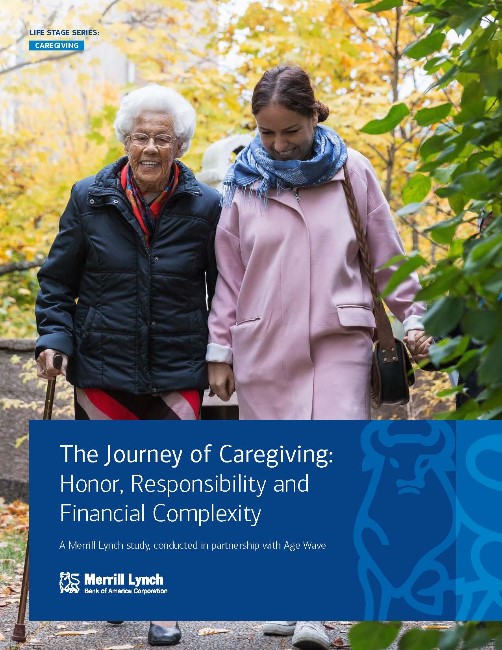For National Family Caregivers Month, we review Merrill Lynch’s just-released 42-page Caregiving Study Report, entitled, The Journey of Caregiving: Honor, Responsibility and Financial Complexity.
While we often think of caregiving as hands-on care, surprisingly, 98% of family caregivers surveyed provide emotional and social support. Only 64% report providing hands on physical care.

Over 2,000 family caregivers in the U.S. were surveyed in partnership with Age Wave. The study authors were struck by the number of caregivers (92%) who help with financial caregiving; yet, 75% have not discussed the topic with their families (page 24). Few are prepared to help and do the best they can paying out of pocket or helping manage (e.g., pay bills) their loved one’s finances (page 22).
Caregivers Are Generally Positive
What remains encouraging are caregivers’ positive feelings. They desire to honor their care recipients and to insure they live with dignity. It’s not easy and caregivers sacrifice a lot. Forty seven percent of adults aged 40-59 are sandwiched in between raising children (they had later in life) and caring for their parents. This report is a testament to the gift of caregiving. In fact, 77% say they would be caregivers, again.
Who Are the Caregivers?
While more men have entered the realm of caregiving, the responsibility continues to fall mostly on women’s shoulders (66%). Women lose an average of $324,000 in wages and benefits (page 12) during their prime earning years. They provide care during their 40s through 60s and spend almost 10% of their lives as caregivers.
Caring for a loved one with dementia adds to the costs due to greater needs over a longer period of time. The estimated direct and indirect costs rise over $750,000. “Direct costs include: professional caregivers, adult day care, long-term care facility, home maintenance, home modifications, grocery delivery, transportation and safety monitoring. Indirect costs include: lost hourly wages, reduced Social Security benefits and lost 401(k) contributions,” page 25.
Family Caregivers Provide Care For…
Most caregivers (49%) provide care for a parent with almost three times as many providing care for Mom, while 24% care for a spouse/partner. Wives tend to care for their husbands by themselves; whereas, adult children will more likely rely on help from family, friends, and paid professionals.
About half surveyed have been caregivers for less than one year. Less than a quarter (24%) have been caregiving for over five years. Sixty one percent of caregivers for a parent say they’ve considered moving their parent into a professional care facility; whereas, only 46% of spousal caregivers have considered this. A reasonable assumption here (not included in this report) is a fear of spending assets, leaving the well-spouse impoverished.
While 10% of people 65 and older live with dementia, they receive 40% of care hours provided by family by. The number of care hours provided for a person with dementia averages to 171 versus about 70 for a person without dementia, or 2.4 times more.
About a third of the caregivers want respite, but don’t get any.
What Caregivers Care about Most
Family caregivers will benefit by the three ways to prepare on pages 39 and 40:
- Save for future health care expenses.
Includes four long-term and health care options beyond Medicare/Medicaid. - Talk openly with family, now.
Seventy five percent have not had these discussions. Includes four topics to cover with loved ones - Seek guidance and support.
Five sources to reach out to for your extended care team during the marathon that is caregiving
We Must Prioritize Caregiving
Policies and technology innovations must adapt to changing nature of caregiving.
By mid-century, the needs of an estimated 84% growth in care recipients will be met by an anemic 13% growth in the number of caregivers. With families spread geographically, dependence on professional caregivers will grow greater. But if caregivers continue to be undervalued (and poorly paid) there won’t be enough to fill demand.
Technology will play a greater role in caregiving. Despite slow adoption, as caregivers grow familiar with better designed options, they’ll feel comfortable using it.
Over 80% of employers say caregiving will become an increasingly important issue in the next five years, only 18% say they are caregiver friendly.
The Caregiver’s Voice recommends improving the accessibility of this 42-page PDF report with clickable bookmarks and endnotes to make it easier to navigate across the chapters, subsections, and citations.
The Journey of Caregiving: Honor, Responsibility and Financial Complexity is available for download at the Merrill Lynch website. Click on button “Get the full report”
A worthy read and reference to return to and help guide future policy initiatives. Caregivers must be supported; especially, spousal caregivers who are doing it alone.









This is great information. Unfortunately caregivers who support loved ones with dementia are not equipped for the journey. And medications do not address behavioural and psychological consequences. I have written a book for caregivers that helps with understanding the connection between brain and behaviour along with strategies for providing support. If you are interested in knowing about the book I wrote for caregivers please visit my website at http://www.dementiability.com. It is called Dementia Caregiving Solutions and Insights.